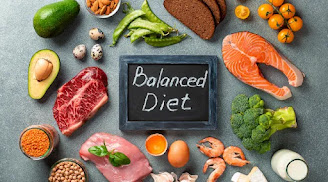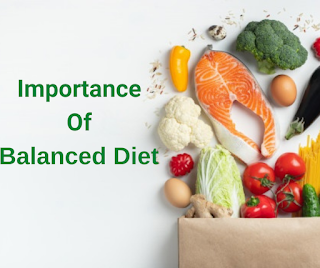A balanced diet is a way of eating that includes all of the nutrients needed in the proper proportions to maintain good health. A well-balanced diet includes a variety of foods in appropriate amounts such as fruits, vegetables, lean proteins, whole grains, and healthy fats.
Here's a quick rundown of what a typical balanced diet consists of:
- Fruits And Vegetables: Vitamins, minerals, and fiber are abundant. They should account for a substantial portion of your daily intake.
- Proteins: Essential amino acids are found in foods such as lean meats, poultry, fish, beans, nuts, and seeds.
- Whole Grains: Fiber, vitamins, and minerals can be found in foods such as brown rice, whole-wheat bread, and quinoa.
- Dairy Or Alternatives: Foods high in calcium, such as milk, yogurt, or fortified plant-based alternatives.
- Healthy Fats: Avocados, nuts, seeds, and olive oil are all good sources. These fats are required for a variety of bodily functions.
- Nutrient Intake: A well-balanced diet provides a variety of essential nutrients such as vitamins, minerals, carbohydrates, proteins, and fats. These nutrients are essential for your body's and its various systems to function properly.
- Energy: It gives you the energy you need for your daily activities. In a well-balanced diet, carbohydrates and fats are the primary sources of energy.
- Weight Management: A well-balanced diet can assist you in maintaining a healthy weight. Obesity and related health issues can be avoided by consuming the appropriate number of calories and avoiding excessive consumption of unhealthy foods.
- Disease Prevention: Eating a balanced diet can reduce the risk of chronic diseases like heart disease, diabetes, and certain types of cancer. Nutrient-rich foods support overall health and may have protective effects.
- Digestive Health: Fiber in fruits, vegetables, and whole grains promotes digestive health and helps to prevent constipation.
- Mental Health: Proper nutrition is linked to better cognitive function and mental well-being. Nutrients like omega-3 fatty acids and certain vitamins are essential for brain health.
- Strong Immune System: A well-balanced diet provides the vitamins and minerals required for a strong immune system, assisting your body in fighting off infections and illnesses.
- Growth And Development: A balanced diet is essential for healthy growth and development in children and adolescents. It promotes the growth of strong bones, muscles, and organs.
- Longevity: Eating well is linked to living a longer and healthier life. It can help you age gracefully and lower your risk of age-related diseases.
- Physical Performance Enhancement: A balanced diet can improve endurance and performance in athletes and people who participate in physical activities.





0 Comments